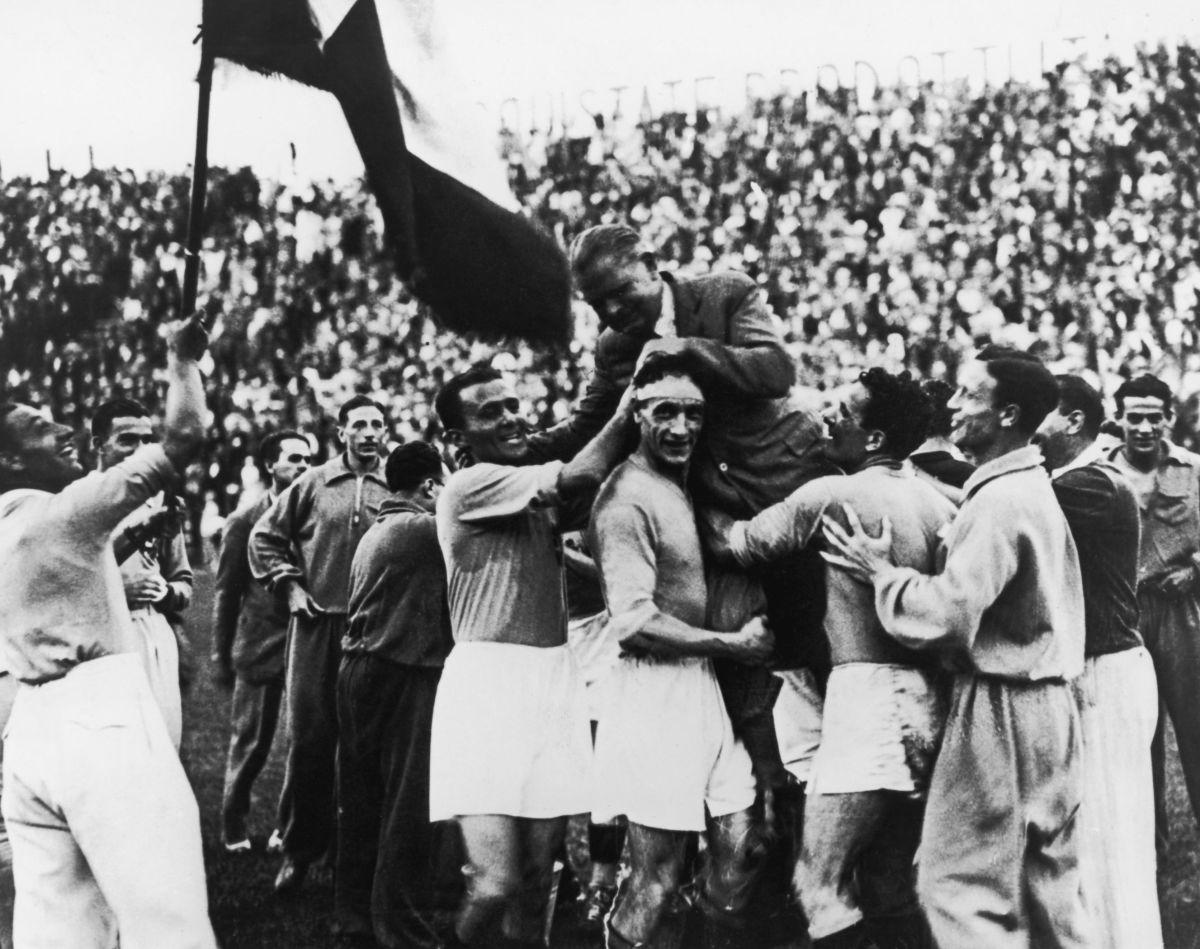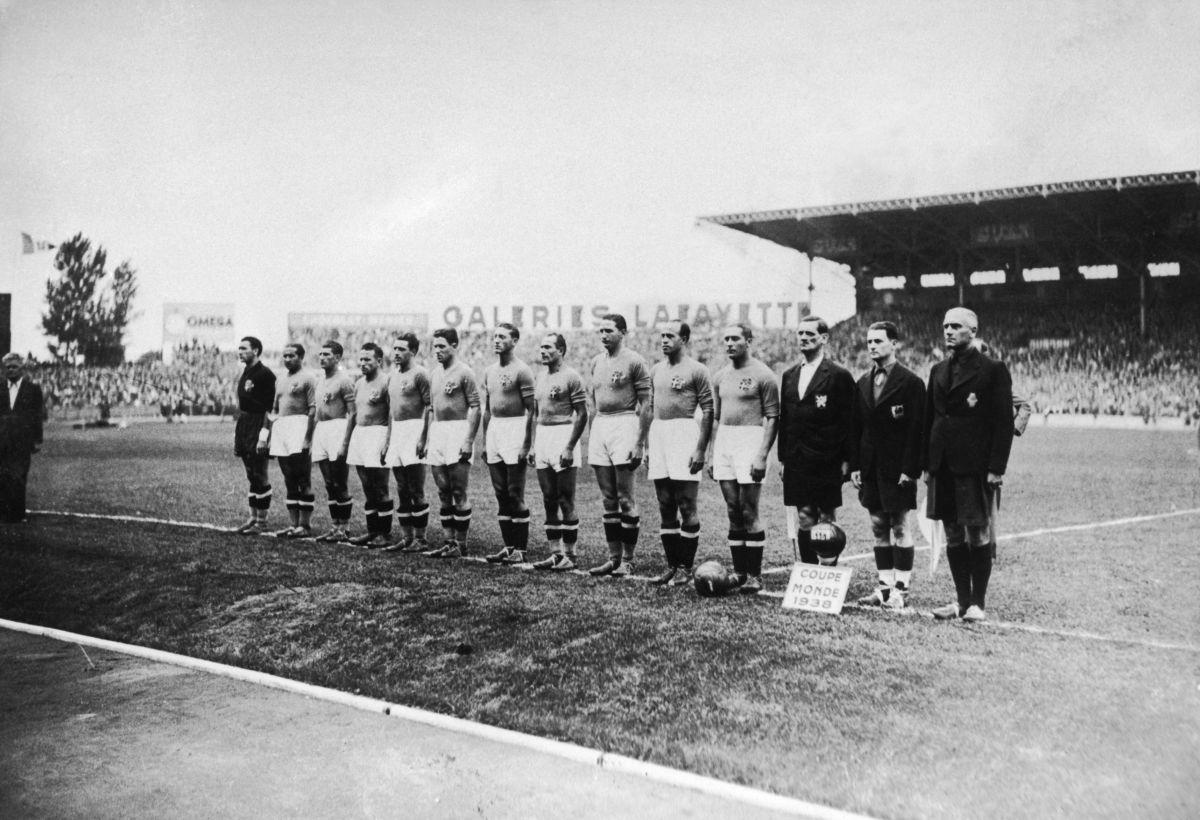Vittorio Pozzo: Metodo, Mussolini, Meazza & the Difficult Memory of a Two-Time World Cup Winner

Vittorio Pozzo is number 27 in 90min's Top 50 Great Managers of All Time series. Follow the rest of the series over the course of the next six weeks.
'Why is Vittorio Pozzo regarded as one of the greatest managers of all time?'
Is a question with a pretty straightforward answer:
Vittorio Pozzo is one of the greatest managers of all time because he is the only manager in history to win two FIFA World Cups.
It's really that simple.
These are the achievements that wholly define Pozzo.
They are why he's remembered.
They are why he's important.
They are why he is one of the greatest managers of all time.

But how these achievements were, well, achieved, is much less straightforward. For while Vittorio Pozzo, the man, the manager, the anglophile, can be summarised with the sentence:
'Vittorio Pozzo is one of the greatest managers of all time because he is the only manager in history to win two FIFA World Cups.'
The Turin native is also a man, manager, anglophile with a very complicated story; a story fraught with supposed corruption, fascism, propaganda, Benito Mussolini, Giuseppe Meazza, and genuine tactical genius.
'Wait...what? Benito Mussolini?'
Yeah, that guy, but before we touch on all those words that just caught your eye - fascism, Mussolini, corruption (in calcio that's unheard of...) - Pozzo deserves some actual praise for being a tactical innovator and winning all of those World Cups.
The 'genuine tactical genius' part of Pozzo's story can't be underestimated; he earned the nickname lI Vecchio Maestro (the old master) for a very good reason.
'Being old?'
Obviously, but he was also a master - we're praising him at the moment, please keep up.
Il Vecchio Maestro's tactical mastery was conceived during one of his many, many, many trips to England during the 1920s (he was an unabashed anglophile). There he would find flaws in the widely used Cambridge Pyramid formation while watching Charlie Roberts and co. playing for Manchester United.
Career Honours |
|---|
1934 & 1938 FIFA World Cup |
1936 Olympic Gold Medal |
1927-30 & 1933-35 Central European International Cup |
The key flaw he found was how gung-ho, zero f*cks given, attacking the Cambridge Pyramid was, with teams playing five forwards from the first minute to the last.
'Five?!'
I know, right? That's at least two too many.
Amazingly, Pozzo was the first to see the clear as day, couldn't be more blatantly obvious, problems with going FIFA 19-style all out attack in every second of every game, and decided to drag two of the five forwards into deeper roles in midfield where they could provide more defensive cover, but also take up roles as creative entities in the side.
The 2-3-2-3 formation was born...or 'Il Metodo', which is a much, much cooler name.
Il Metodo would be the tactical innovation that would unlock the generational talents of Giuseppe Meazza, make Italy defensively impenetrable, win the country two consecutive FIFA World Cups, and - perhaps most importantly - change the Italian tactical outlook on calcio.
🏆🇮🇹🏆@azzurri were just nine minutes away from defeat in the 1934 final, but Vittorio Pozzo is now remembered as the only coach to win back-to-back #WorldCup titles.
— FIFA World Cup (@FIFAWorldCup) January 28, 2018
Learn more about them here
👉https://t.co/ynOMyD5vsq pic.twitter.com/XoCdiCHUnn
The 1934 and 1938 World Cup winner didn't invent what we now know as catenaccio, that was Helenio Herrera's brainchild (you'll read about him later in this series, don't worry), but he was the first manager on the peninsula to set up a team to defend and win at all costs.
This defensive mindset would come to define calcio from the 1930s to the present day.
It's the mindset that led to Italy winning four World Cups.
It's the mindset that bred the greatest defenders of all time - Franco Baresi, Paolo Maldini, Fabio Cannavaro, Alessandro Nesta, Gaetano Scirea etc.
In short: Pozzo defined Italian football.
So yes, all of the above suggests Vittorio Pozzo may very well be the greatest Italian manager of all time, but for the reasons you are about to read, he is also one that many would prefer to forget.
'Ohhhhh, this is the bit about politics.'
Yes, yes it is.
12th June 1938. FIFA World Cup. Italy vs. France. The hosts vs. the holders. A game that would be remembered forever. Just not for the right reasons.

Rather than a brilliant Meazza goal, or a brilliant performance in goal from Aldo Olivieri, it is an incident during the Italian national anthem that makes this game one of the most memorable in World Cup history.
During the singing of the Italian national anthem, Gli Azzurri lined up on the pitch and performed the Roman fascist salute; something that was rightly greeted with a chorus of boos from the French crowd - a chorus so loud that it forced the Italian national team to gingerly lower their arms. After witnessing his team succumb to the crowd pressure, Pozzo marched out onto the field and ordered his team to put their arms up once again.
"Our players don't even dream to make some politics, but the fascist salute is the official flag of the moment, it's a sort of ceremony and they must show allegiance."
Vittorio Pozzo
It was an act of what one can only assume to be loyalty to Benito Mussolini and the rise of fascism in Europe, and an act which explicitly marred the memory of one of the greatest managers of all time.
Sadly, this incident wasn't a singular purveyance of fascism and Mussolini in the story of Vittorio Pozzo.
Sadly, all of Pozzo's achievements in football are blotted by Italian fascism.
The 1934 World Cup, held in Italy, is perceived to have been won under the pretence of fascist propaganda and assumed to have been won with a little political help from Benito Mussolini.
Then the 1938 World Cup was won with a huge amount of the top nations abstaining from the tournament due ripples of the political upheaval fascism was causing in Europe on the eve of World War II.
Teams Managed |
|---|
Italy |
Torino |
AC Milan |
'This is all a bit heavy.'
Yeah, it really is, and it complicates the memory of Vittorio Pozzo.
There's no doubting that, tactically, Pozzo is one of the most significant managers of all time.
That's a fact.
There's no doubting that Pozzo is the only manager to win two FIFA World Cups.
That's a fact.
How these were won though, is a sticking point. Without the baggage of fascism and corruption, one could argue that Vittorio Pozzo would be regarded as the undisputed greatest manager of all time. But that baggage is there. It permeates every memory of Vittorio Pozzo, and it mars one of the most astonishing managerial careers in history.
Number 50: Marcelo Bielsa - El Loco's Journey From Argentina to Footballing Immortality in Europe
Number 49: Vic Buckingham - How an Englishman Discovered Johan Cruyff & Pioneered Total Football
Number 48: Claudio Ranieri: A Ridiculed Tinkerman Who Masterminded One of Football's Greatest Ever Achievements
Number 47: Bill Nicholson: Mr Tottenham Hotspur, the First Double Winning Manager of the 20th Century
Number 46: Sven-Goran Eriksson: The Scudetto Winning Shagger Who Never Solved the Lampard-Gerrard Conundrum
Number 45: Sir Alf Ramsey: The Man Behind the 'Wingless Wonders' & England's Sole World Cup Triumph
Number 44: Antonio Conte: An Astute Tactician Whose Perfectionist Philosophy Reinvented the 3-5-2 Wheel
Number 43: Kenny Dalglish: The Beacon of Light in Liverpool's Darkest Hour
Number 42: Massimiliano Allegri: The Masterful Tactician Who Won Serie A Five Times in a Row
Number 41: Sir Bobby Robson: A Footballing Colossus Whose Fighting Spirit Ensured an Immortal Legacy
Number 40: Luis Aragones: Spain's Most Important Manager, the Atleti Rock and the Modern Father of Tiki-Taka
Number 39: Herbert Chapman: One of Football's Great Innovators & Mastermind Behind the 'W-M' Formation
Number 38: Carlos Alberto Parreira: The International Specialist Who Never Shied Away From a Challenge
Number 37: Franz Beckenbauer: The German Giant Whose Playing Career Overshadowed His Managerial Genius
Number 36: Viktor Maslov: Soviet Pioneer of the 4-4-2 & the Innovator of Pressing
Number 35: Rafa Benitez: The Conquerer of La Liga Who Masterminded That Comeback in Istanbul
Number 34: Zinedine Zidane: Cataloguing the Frenchman's Transition From Midfield Magician to Managerial Maestro
Number 33: Luiz Felipe Scolari: How the Enigmatic 'Big Phil' Succeeded as Much as He Failed on the Big Stage
Number 32: Jupp Heynckes: The Legendary Manager Who Masterminded 'the Greatest Bayern Side Ever'
Number 31: Vicente del Bosque: The Unluckiest Manager in the World Who Led Spain to Immortality
Number 30: Arsene Wenger: A Pioneering Who Became Invincible at Arsenal
Number 29: Udo Lattek: The Bundesliga Icon Who Shattered European Records
Number 28: Jock Stein: The Man Who Guided Celtic to Historic Heights & Mentored Sir Alex Ferguson
